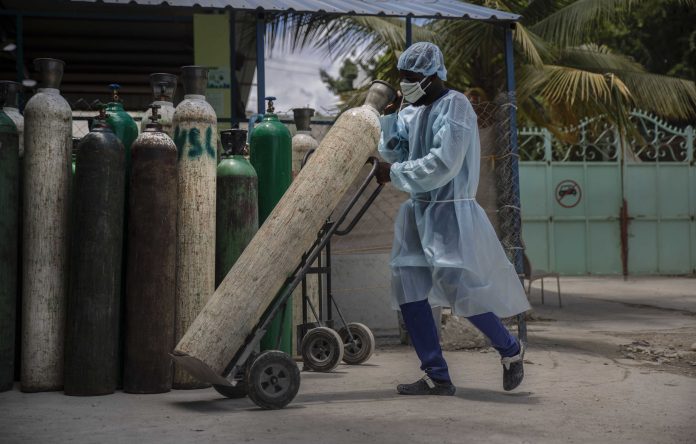
By DÁNICA COTO
Associated Press
SAN JUAN, Puerto Rico (AP) — Officials offered new promises Thursday that Haiti would soon receive its first vaccine as the country of more than 11 million people reels from a spike in coronavirus cases and COVID-19 deaths that have saturated hospitals.
Speaking during an online meeting, Margherita Ghiselli with the Pan American Health Organization said vaccinations in Haiti would start “very soon,” though she did not say exactly when the doses would arrive.
Meanwhile, a U.N. program that delivers coronavirus vaccines to poor countries and has Haiti on its list has cut its supply forecast this year by more than 100 million doses. It wasn’t immediately clear how that might affect the delivery of vaccine to Haiti via the COVAX program, but officials were wary of the news.
Robert Barrais, with Haiti’s Ministry of Public Health, said during the meeting that hospitalizations have nearly doubled and that the country is still in the pandemic’s critical phase. Officials have reported more than 17,900 confirmed coronavirus infections and 400 deaths from COVID-19, although experts say they believe those numbers are severely underreported given the lack of widespread testing.
“The fact that we don’t have vaccines yet, that explains the current situation we have in the country,” Barrais said.
Haiti was slated to receive some 756,000 doses of AstraZeneca vaccine last month as part of the U.N.’s COVAX program, but government officials were concerned about the vaccine’s potential side effects and of possibly being forced to throw away doses given the lack of infrastructure to keep them properly refrigerated.
Officials later announced that some 130,000 doses were supposed to arrive in mid-June, but the shipment was delayed for unknown reasons.
Even if the doses do arrive, officials worry they still have to persuade thousands of Haitians to get inoculated amid widespread mistrust of the vaccines and of health authorities.
During Thursday’s meeting, Ronald Jean-Jacques, a professor at Haiti’s State University, shared a survey in which he interviewed more than 5,300 Haitians. More than 60% said they would not take the vaccine, while an additional 10% said they had not even heard of a coronavirus vaccine, highlighting warnings by international agencies that stronger and more widespread educational campaigns are needed.
“We’re always going to have people who don’t want the vaccine,” said David Fitter, an official with the U.S. Centers for Disease Control and Prevention.
Not everyone is concerned.
Marco Jean-Pierre, an industrial mechanic, said he would take the vaccine if it would help him live longer. He added that he believes rumors that the vaccines have supposedly arrived and that only government officials and Haiti’s elite have received doses.
Jean-Pierre said he lamented living in a country where nothing is guaranteed.
“If I have the opportunity to have a life somewhere else, that’s what I would do,” he said. “Take my kid, and goodbye, Haiti.”
















